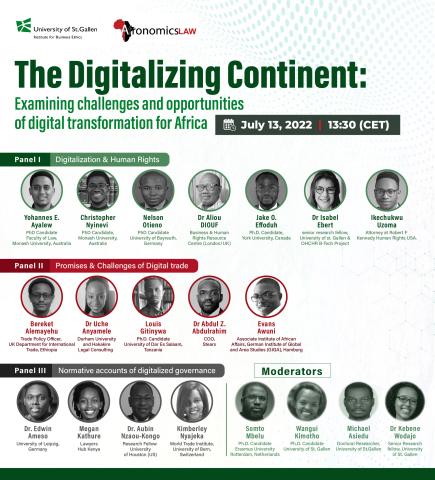
July 12th 2022
This Workshop is a follow up to the call for papers between the Competence Center for African Research (CCAR), University of St Gallen and Afronomicslaw.org. The Workshop seeks to examine the ongoing effort towards digital transformation, and particularly E-Commerce in Africa.
Date: July 13th 2022
Registation via Zoom here
Download Conference Program here.
The fourth industrial revolution (4IR) is marked by an intensive digitalisation process. Within this process, digital data (physical information converted into digital) and digital technologies restructure how things are done and values created. Among various initiatives intended to galvanise such processes is the E-Commerce Protocol of the African Continental Free Trade Area (AfCFTA), which is still under discussion. Digital economy and e-commerce survive and thrive through a web of complex contractual and noncontractual relationships between actors, including consumers, businesses and governments. Weak and fragmented regulation in areas such as consumer, data and privacy protection on the one hand risks enabling those in control of capital and political power, the corporations and governments, to configure the digitalization process to their interest (i.e., profit and power maximization). On the other hand, weak regulation in such areas means leaving users with weak or no protection and hence, erode consumers’ trust to make use of and benefit from the digital transformation. In addition, leverage over the operation and outcome of such connectivity is impacted by existing and emergent constraints such as: digital divide, infrastructural challenges, misfit between Intellectual Property (IP) system and emerging data driven technologies, and taxes, tariffs and non-tariff barriers. Most importantly, transformation and connectivity outcomes are shaped also by historical and existing institutional, regulatory and societal cultures and embedded power relationships.